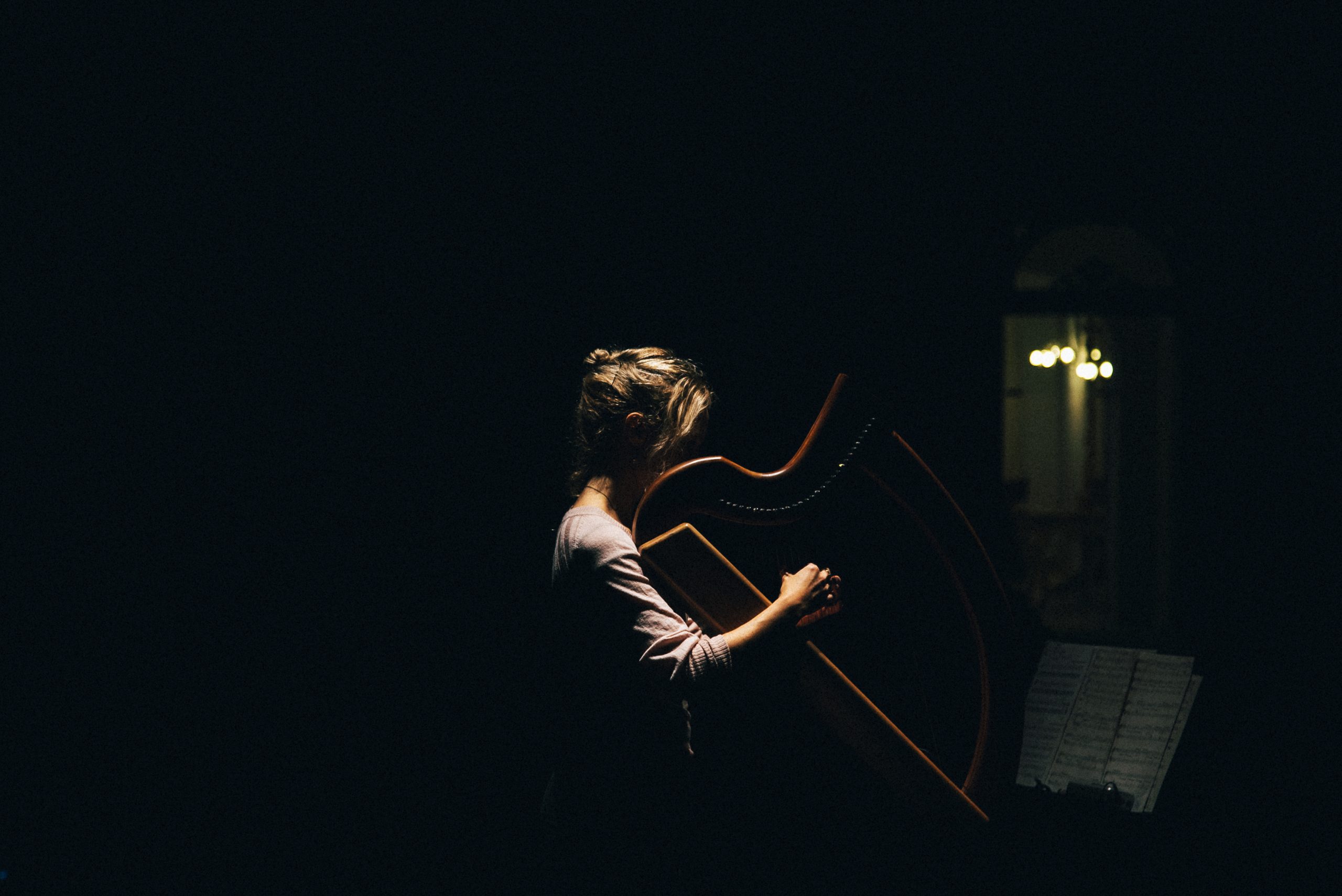Versatile harpist and composer duo present migrant-themed folk music, reimagined.
,
FitkinWall, Harpland | Sale Waterside Theatre | 17th October
Reviewed by Joseph Hunter
The café at the Sale Waterside theatre was making me feel insecure. It wasn’t the café’s fault, it was mine. The café – and the theatre itself – is gorgeous. Pristine, white-rendered walls. Artfully-distressed brown leather chairs. Flickering electric candles and a background of soul music. It reminds me, by contrast, what a mess my house is in; that I am behind on various DIY projects; that it’s a ‘school night’ and I have a full day of work ahead of me tomorrow. But I was there to listen to a multimedia concert of harp music by Fitkinwall – a collaboration between harpist Ruth Wall and composer Graham Fitkin – so I tried to quiet my unquiet mind.
Taking our seats in the auditorium we admire the three harps standing on stage. The first is solid, wooden, and carved; the second glossy, black and sharp like an emerging shark’s fin; the third jagged and elongated like a giant, hollowed-out tooth. Footlights threw long harp-shadows onto the curtain behind. These are Wall’s instruments, and during the concert she flits between them, sometimes during pieces. Fitkin, meanwhile, operates a laptop and pad from a table to one side of the stage.
Harpland, we are told when the two performers take the stage, presents music inspired by migrations ancient and modern. The pieces are mostly reworkings/reimaginings of folk music, and in between are vocal recordings of contemporary migrants telling their stories. Fitkin assures us that all the samples he uses are from harps, which is fascinating given the delightful and unexpected ways in which his electronic contributions warp, bend, and resonate those samples. A light installation by Peter Freeman responds to the music, adding another visual element to an already striking stage presence.
The first piece, ‘Atholl’, uses samples that sound like chuckling, flowing water. Over this Wall’s harp begins slowly, walking, rising to intricate melodies and countermelodies. ‘Geal Og’ is more tentative, with a haunting sound bed and tentative repeated notes as if Wall is calling forth a memory. The lights strobe, and bring deeper, bassier notes from Fitkin.
‘Uist’ sees Wall playing melodies and then manipulating dials, creating pulsing sounds that are accompanied by surges of light across the stage reminiscent of a sweeping lighthouse beam – red, then green – with the mournful calling of seabirds low in the mix.
‘Y Gog’, played on the largest of the three harps (a Bray harp), draws on the clashing, vibrating sounds of the strings against the wood. It’s lively, like a dance in a big stone hall, speeding up, driving on, forcing my foot to tap.
After a moving recording of a distressed, stranded Ukrainian immigrant comes ‘Red Red Rose’. High notes like icicles about to drop and shatter, then low reverberating echoes that build to a huge, ponderous soundscape. The final piece of the first half, conversely, is another foot-tapper: ‘Beinn Dorain’, dance music built out of strikes of the harp strings, creating an uncertainty that resolves into a triumph of flashing lights and pulsing harps. I compare it to a rave in heaven – my partner calls it ‘techno-harps’.
The second half begins with ‘Harris Gregor’, a piece that Fitkin tells us is really two pieces ‘mashed together’, and sees Wall move between two harps. Reversed note-samples bring shimmers of light, while the melody over the top sounds like a harp coming close to a wordless human voice. For ‘I Ho Ro’ Wall plucks intricate patterns, including muted strings like a bass guitar and tactile hand-heel movements that enhance the atmospheric effect.
After an immigrant interview with a young man emphasising the kindness of the people he has found himself among, ‘Yalda’, a traditional Iranian piece, proves to be the most joyous music of the evening (for me, anyway). Rousing, celebratory, played on the Bray harp with a stop-start rhythm that gives it a kinetic dancing movement. An interesting contrast is provided by the next piece, ‘Nam Ban’: slow, careful harp strings electronically bent and warped. It’s a red shift of sound, elongating and eerie. Once again, Wall moves between harps for this piece.
The penultimate piece, ‘Ale is Dear’, is at first strident and challenging, with some of the harp notes Wall plays being struck so percussively as to break off. Then, a flowing series of electronic samples build a second stream of sound underneath that carries the harp along.
It’s during the final piece, ’17 Come Sunday’, I realise with relief that I stopped worrying about my to-do list some time ago, and am fully immersed in the song’s layered polyphonic babble. This babble is then smoothed over by a sculptural, caressing melody from Wall – another piece during which the melodies and countermelodies she plays seem to require at least three hands. I think about the Harpland‘s theme – migration – in part about becoming, ever moving from one place to the other. But in the process of that ceaseless human movement is beauty, if you take the time to look at it in the right way.
Harpland, by FitkinWall, will be released in 2024.
Reviewed by Joseph Hunter
